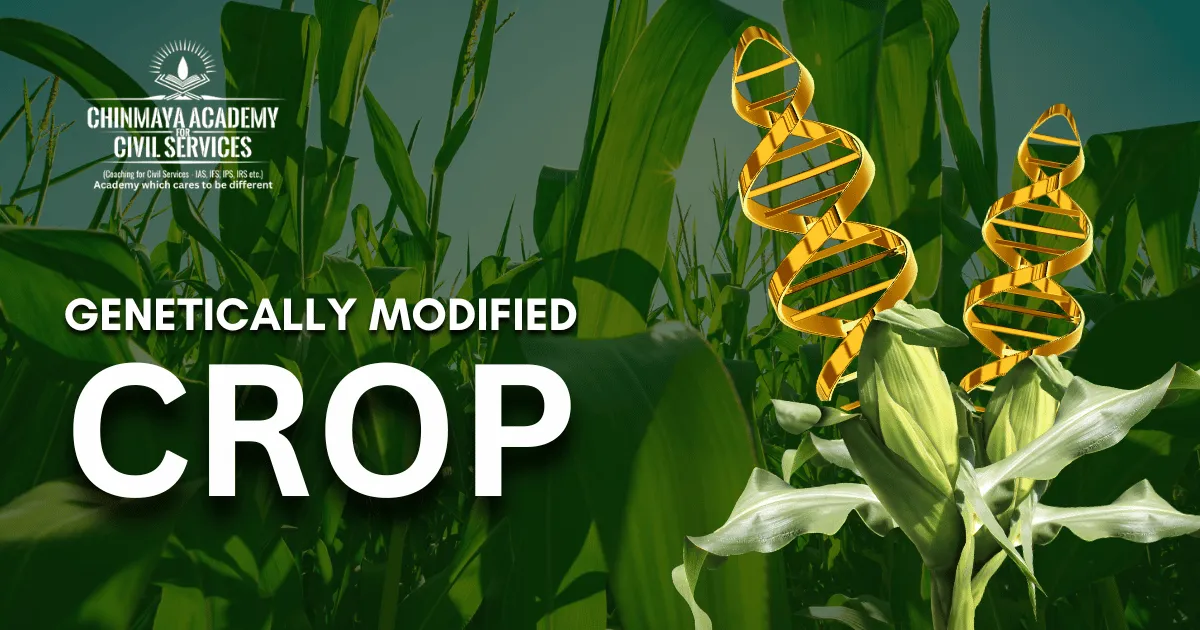
Genetically modified (GM) crops, also known as transgenic crops, are plants that have had their genetic makeup altered in a way that doesn’t occur naturally. This is done through techniques like gene insertion, removal, or modification using genetic engineering tools.
What are they?
- Crops with their DNA deliberately altered to introduce new traits or enhance existing ones.
- Achieved through techniques like inserting genes from other organisms or modifying the plant’s own genetic code.
Goals of GM technology in agriculture:
Increased yield and productivity:
- GM crops can be engineered to resist pests and diseases, tolerate harsh environments, and produce higher yields.
- This can lead to increased food security and economic benefits for farmers.
Improved nutritional value:
- Crops can be fortified with essential vitamins and minerals, addressing malnutrition and dietary deficiencies.
- Examples include Golden Rice enriched with Vitamin A.
Enhanced sustainability:
- GM crops can be engineered to require less water and fertilizer, reducing environmental impact and promoting sustainable agriculture.
Herbicide tolerance:
- Some GM crops are resistant to specific herbicides, allowing farmers to control weeds more effectively while minimizing harm to the crop itself.
Examples of GM crops:
Bt cotton:
- Contains a gene from the bacterium Bacillus thuringiensis (Bt) that produces a protein toxic to certain insect pests, reducing pesticide use.
Herbicide-resistant soybeans and corn:
- Engineered to withstand specific herbicides, simplifying weed control for farmers.
Golden Rice:
- Contains genes from other plants that enable it to produce beta-carotene, a precursor to Vitamin A, addressing Vitamin A deficiency in regions where rice is a staple food.
Challenges and concerns:
Safety:
- Potential risks to human health and the environment are a major concern, although extensive testing and regulations are in place.
Ethical considerations:
- Modifying organisms raises ethical questions about interfering with nature and potential unintended consequences.
Socioeconomic impact:
- Concerns exist about corporate control of seeds and potential negative impacts on small farmers.
Current Scenario in INDIA
Only one commercially cultivated GM crop:
- Bt cotton, introduced in 2002, dominates the country’s cotton production, accounting for nearly 96% of cotton area.
- Its pest resistance has demonstrably increased yields and farmer income.
Field trials for other crops:
- Trials are underway for brinjal, tomato, maize, and chickpea using transgenic technology.
- However, commercial release remains stalled due to regulatory hurdles and public concerns.
Mustard on the cusp of commercialization:
- The GEAC approved GM mustard hybrid DMH-11 in October 2022, bringing it closer to full cultivation.
- However, legal challenges still exist, delaying its potential widespread adoption.
Prelims Facts
|
Colombo Security Conclave’s |
About The CSC is a trilateral maritime security alliance comprising the Maldives, Sri Lanka, and India that was established in 2011.
|
|
Agni Path |
The Agnipath Scheme is a revolutionary recruitment program launched by the Indian government in June 2022 to transform the way soldiers are recruited into the Indian Armed Forces. It aims to bring in a younger, fitter, and more tech-savvy workforce while reducing the pension burden on the military. |
 Chinmaya IAS Academy – Current Affairs Chinmaya IAS Academy – Current Affairs
Chinmaya IAS Academy – Current Affairs Chinmaya IAS Academy – Current Affairs
